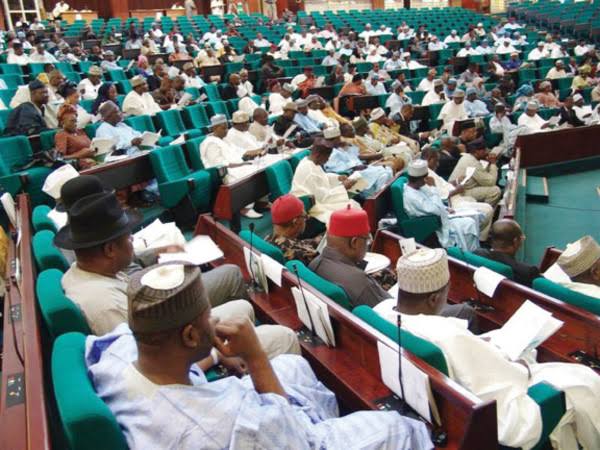A BILL seeking to amend the National Youth Service Corps Act to, among other proposals, make the compulsory one-year national youth service for under-30 graduates optional suffered a setback at the House of Representatives on Tuesday.
The bill, which also seeks to create more allowances for NYSC members and make it optional for someone who graduates at 30 and above to obtain a Certificate of Exemption, failed to pass second reading as it faced stiff opposition, especially from members of the House from the North.
Those who criticised the bill include the Deputy Speaker, Ahmed Wase (Plateau); Majority Whip, Mohammed Monguno (Borno); Ahmad Jaha (Borno), Leke Abejide (Kogi), among others.
The legislation is titled ‘A Bill for an Act to Amend the National Youth Service Corps Act, Cap. N84 Laws of the Federation of Nigeria, 2004 to Review Upward the Accommodation and Transport Allowances of Corps Members in Line with Current Realities; and for Related Matters.’
The bill, which is jointly sponsored by Messrs Eta Mbora, Abass Adigun, Ben Igbakapa, Moshood Akinolu and Oluyemi Taiwo, is a product of harmonisation of Bills 716, 1305, 1657, 1922, 1945 and 1674, which were separately sponsored by the lawmakers.
The Senate and the House usually harmonise bills that are seeking similar or various amendments to an Act or Constitution.
The bill also sought to amend Section 17 (1) of the Act by introducing a proviso thus: “Provided that any category of Nigerians who have applied to the directorate to be exempted from the service shall be exempted forthwith and shall not be bound by any provisions of this Act that may affect his rights as a citizen of Nigeria.”
“Igbakpa wrote in the explanatory note, “This bill seeks to amend the National Youth Service Corps Act, Cap. N84 Laws of the Federation of Nigeria 2004, to provide that the national youth service is not compulsory but optional for persons specified in the call-up instrument.”
“Leading the debate on the bill at the second reading on Tuesday, Igbakpa noted that the amendment seeks to do three different things because the law is based on the “changing realities of time.”
He said since a corps member is deemed to have graduated from a higher institution, “the N30,000 (monthly allowance) given to them, as it is today, is a minimum wage threshold. In line with the present reality, it would not be fair if they are not given something that befits a graduate, a (Grade) Level 8 officer in the public service.”
Igbakpa added, “Secondly, with the changing times, it is our belief that this exercise should no longer be compulsory and that is why there is an amendment we were proposing to remove the word ‘SHALL’ from Section 2 Subsection 1 of the principal Act and bring in ‘MAY’, making it optional for people to attend.
“The third: as at the time the law was made, it was in such a way that we did not consider our children schooling abroad. Not long ago, a former Minister of Finance schooled abroad, was above 30 and came to Nigeria to help with the knowledge. But because of the stringent conditions placed on the acquisition of Certificate of Exception there was something wrong and at the end of the day, we lost that intelligence and expertise.”
A former Minister of Finance, Kemi Adeosun, had resigned over the controversy surrounding her NYSC certificate.
In her letter of resignation tendered to President Muhammadu Buhari, Adeosun had partly written, “I was born and raised in the United Kingdom. Indeed my parental family home remains in London. My visits to Nigeria up until the age of thirty-four (34) were holidays, with visas obtained in my UK passport.
“I obtained my first Nigerian passport at the age of thirty-four (34) and when I relocated there was debate as to whether NYSC law applied to me. Upon enquiry as to my status relating to NYSC, I was informed that due to my residency history and having exceeded the age of thirty (30), I was exempted from the requirement to serve. Until recent events, that remained my understanding.”
The ex-minister added that following her request for a Certificate of Exemption, a fake one was allegedly issued to her without her knowledge until it became a scandal after getting the appointment.
However, Wase argued that the drafters of Nigerian laws did not make a mistake by creating the NYSC scheme, adding that one of the reasons was because they wanted national integration.
“Those who schooled abroad should comply with the by-laws we have set in the country. In several countries we have programs like this. The purpose is integration and discipline,” he stated.
Jaha also said, “While I agree with the remuneration aspect of the bill, I disagree with the optional part of the NYSC.
A substantial part of graduates recognise the importance of the NYSC after having one because by the time they go out, they will discover a lot of things they have not been conversant with in their area.
“So, if you say it is optional, people may think it is not serious. They would make it optional and they would be reluctant to go. But if you make it compulsory, definitely everybody would go and at least discover something outside his domain.”







